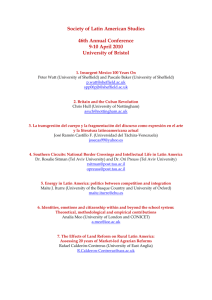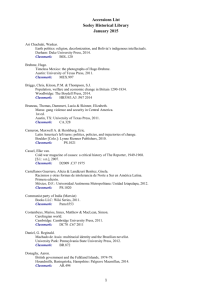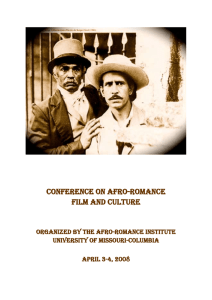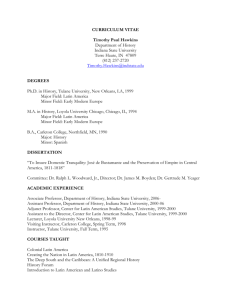1 - SLAS
advertisement
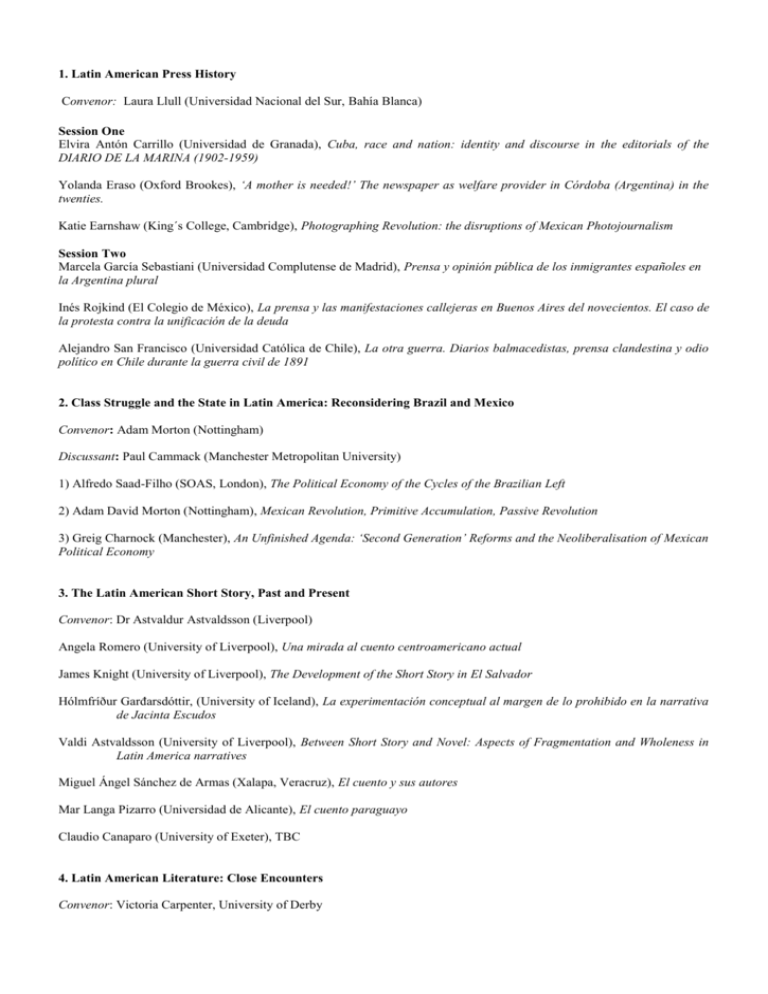
1. Latin American Press History Convenor: Laura Llull (Universidad Nacional del Sur, Bahía Blanca) Session One Elvira Antón Carrillo (Universidad de Granada), Cuba, race and nation: identity and discourse in the editorials of the DIARIO DE LA MARINA (1902-1959) Yolanda Eraso (Oxford Brookes), ‘A mother is needed!’ The newspaper as welfare provider in Córdoba (Argentina) in the twenties. Katie Earnshaw (King´s College, Cambridge), Photographing Revolution: the disruptions of Mexican Photojournalism Session Two Marcela García Sebastiani (Universidad Complutense de Madrid), Prensa y opinión pública de los inmigrantes españoles en la Argentina plural Inés Rojkind (El Colegio de México), La prensa y las manifestaciones callejeras en Buenos Aires del novecientos. El caso de la protesta contra la unificación de la deuda Alejandro San Francisco (Universidad Católica de Chile), La otra guerra. Diarios balmacedistas, prensa clandestina y odio político en Chile durante la guerra civil de 1891 2. Class Struggle and the State in Latin America: Reconsidering Brazil and Mexico Convenor: Adam Morton (Nottingham) Discussant: Paul Cammack (Manchester Metropolitan University) 1) Alfredo Saad-Filho (SOAS, London), The Political Economy of the Cycles of the Brazilian Left 2) Adam David Morton (Nottingham), Mexican Revolution, Primitive Accumulation, Passive Revolution 3) Greig Charnock (Manchester), An Unfinished Agenda: ‘Second Generation’ Reforms and the Neoliberalisation of Mexican Political Economy 3. The Latin American Short Story, Past and Present Convenor: Dr Astvaldur Astvaldsson (Liverpool) Angela Romero (University of Liverpool), Una mirada al cuento centroamericano actual James Knight (University of Liverpool), The Development of the Short Story in El Salvador Hólmfríður Garđarsdóttir, (University of Iceland), La experimentación conceptual al margen de lo prohibido en la narrativa de Jacinta Escudos Valdi Astvaldsson (University of Liverpool), Between Short Story and Novel: Aspects of Fragmentation and Wholeness in Latin America narratives Miguel Ángel Sánchez de Armas (Xalapa, Veracruz), El cuento y sus autores Mar Langa Pizarro (Universidad de Alicante), El cuento paraguayo Claudio Canaparo (University of Exeter), TBC 4. Latin American Literature: Close Encounters Convenor: Victoria Carpenter, University of Derby Session 1: (Re)reading History Emilse Hidalgo (University of Nottingham), The Representation of History, Memory and Defeat in Postmodern Fiction of the 1990s in Argentina and Britain Holmfridur Gardasdottir (University of Iceland), La reconciliación social y política argentina por medio de la “nueva novela histórica”: El río inmóbil (2001) de Cristina Feijoó Phil Swanson (University of Sheffield), Cooking the Books: Recipes, Biography and History in Isabel Allende Adriana Churampi Ramírez (University of Leiden), Los invisibles autores de la historia con minúsculas - La Pentalogía de Manuel Scorza Session 2: (Re)reading Identity Helen Oakley (Open University), Constructions of Cuban American Identity in the Crime Fiction of Carolina García Aguilera Rosalie Sitman (University of Tel Aviv), Her Own Mistress: Victoria Ocampo and the Search for a Feminine Voice in a Masculine World Marcia Hoppe Navarro (Brazil), La mujer indígena en la reciente literatura latinoamericana 5. Changing national conciousness in revolution Convenor: Ana Souto (Nottingham) Guy Baron (Nottingham): The image of the mother-figure in ‘Lejanía’ (1985) Natasha Picôt (Nottingham): The representation of the indigenous in Diego Rivera’s National Palace Mural Ana Souto (Nottingham): Building national identity. Architecture in Post-revolutionary Mexico Katie Earnshaw, King's College, Cambridge: Photographing Revolution: the disruptions of Mexican Photojournalism 6. El Salvador 15 Years After the Peace Accords Co-Convenors: Mo Hume (University of Glasgow) and Cath Collins (Chatham House) Gabriella Citroni (University of Milano-Bicocca), El Salvador and the Protection of Human Rights: an Ambiguous Approach Cath Collins (Chatham House), Post-transitional justice in El Salvador Mo Hume (University of Glasgow), Gangs and governance in El Salvador Miguel Cruz (IUDOP, UCA, San Salvador), Democratic governance and the culture of violence in El Salvador Fco. Javier Jover Martí (Centro de Estudios Territoriales Iberoamericanos (CETI), Universidad de Castilla-La Mancha), Guerra y postguerra en El Salvador: consecuencias en el desarrollo del turismo. 7. Individual, local and global perceptions of wellbeing in Peru and beyond. Convenors: James Copestake (University of Bath) and Teófilo Altamirano (Universidad Católica del Peru) Session 1. JL Alvarez, J Copestake, T Hinks, J Velazco, Researching wellbeing and development in Peru: a corridor analysis J Yamamoto, Local and global components of life satisfaction along the Peruvian corridor: an integrative approach JL Alvarez, J Copestake, Collective action and participation in food transfer programmes along a Peruvian corridor Session 2 B Lockley, with T Altamirano, J Copestake, Spatial movement and wellbeing along a Peruvian corridor T Altamirano, Transnationalism and local development: highland Peruvian shepherds in the USA K Wright-Revolledo, Identity and wellbeing across spatial boundaries: the experience of Peruvian migrants in London and Madrid 8. Britain and Latin America Convenor: Dr Will Fowler (St Andrews) Session 1 Dr Will Fowler (University of St Andrews) British Perceptions of Mid-nineteenth Century Mexican Society: Frances Erskine’s Life in Mexico (1843) Dr Silvestre Villegas Revueltas (Universidad Nacional Autónoma de México) Políticas comerciales Gran Bretaña-México, 1870-80 Prof. Paul Garner (University of Leeds), Sir Weetman Pearson and Mexican National Development, 1889-1919 Session 2 Dr Abdiel Oñate (San Francisco State University), British and French Bankers in Revolutionary Mexico. Or how not to collect on the foreign debts on Mexico, 1916-1925 Chris Hull (University of Nottingham), Lionel Carden and the frustrated Anglo-Cuban Commercial Treaty, 1901-1906 Edmundo Murray (University of Zurich), Irish Anarchists and Revolutionaries in Latin America Session 3 Dr Rory Miller (University of Liverpool), British Firms and Populist Nationalism in Post-War Latin America Dr Mario Aguilar (University of St Andrews), Pinochet in London and the Death of Fr. Michael Woodward: An Example of Disrupted Anglo-Chilean Relations 9. Institutional Design, Development and The Quality of Democracy: Conceptual Innovations and Empirical Challenges for Latin America Panel Convenors: Marco Larizza mlariz@essex.ac.uk PhD Candidate, Department of Government University of Essex Jairo Acuña-Alfaro jairo.acuna@sant.ox.ac.uk DPhil Candidate, Department of International Development University of Oxford Democratization has meant a turning point in many aspects for Latin American societies: with a few exceptions, incumbent Presidents and most Members of Parliaments (MPs) are now elected in competitive elections under at least minimal standards of freedom and fairness. Competition and alternation in office take place across the region, to the point that the countries of Latin America now comprise a new democratic universe. And yet, the democratic quality of these “polyarchies” is highly uneven. Scholars have analysed this cross-national variety by considering Democracy as a multi-dimensional phenomenon made up of a number of conceptually relevant properties that must be present before a polity can be defined a fully-fledged democracy. The result is a promising field or studies seeking to measure and explain what kind of democracies are emerging in Latin America, while also attempting to identify the critical factors (i.e. institutional design, development, power distribution) affecting their quality. Several issues still need to be addressed by scholars: which institutional constraints are most critical in improving the quality of democracy in Latin America and how can they be measured and contextualised? Do uneven levels of democracy influence uneven levels of development and inequality in the region? Or is the causal direction the other way around, with unequal resource distributions affecting the viability of democratic governance? This panel attempts to provide a common framework for addressing empirical challenges faced in the identification of strengths and weaknesses in formal and informal Latin American “institutions”, while also offering alternative and innovative answers to questions such as 1) How the variable ‘quality of Democracy’ should be measured; 2) How to uncover key-factors explaining variations in the ‘quality of Democracy’ across time and space. The presentations will address some of the following questions: How to measure democracy and its dimensions? What affects the quality of democracy in Latin America? Are institutional factors and institutional reforms critical in deepening the quality of Democracy and improving development? Which is the role played by structural factors such as economic development and income distribution? And - Last but not least – how democracy and its attributes can contribute towards social and economic development? Preliminary Agenda Session 1 Mikael Wigell (London School of Economics) Classifying Democratic Regimes in Latin America Jairo Acuña-Alfaro (University of Oxford) Third Wave’s Democratic Dividend towards Human Development in Latin America Gerardo Munck (University of Southern California) Monitoring Democracy: Deepening an Emerging Consensus Discussants: Joe Foweraker (Essex) David Beetham (Leeds) Session 2 Marco Larizza (University of Essex) Looking inside the foggy zone: what makes illiberal democracies to endure in Latin America? Marisol Reyes (University of Essex) Explanatory Factors of the Patterns of Turnout in Latin America (1980-2000) Jorge Vargas-Cullel (State of the Nation Programme, Costa Rica) tbc The Fiscal Dimension of the Quality of Democracy in Latin America Discussants: Joe Foweraker (Essex) David Beetham (Leeds) 10. Imagining the impossible: textual, aural and visual negotiations of the city in Latin America. Convenor: Dr Niamh Thornton (University of Ulster, Coleraine Campus) Session One Dr Catherine Leen (NUI, Maynooth), Reimagining the City in Contemporary Argentine Cinema Dr Claire Williams (University of Liverpool), Tourist Heaven or Inhabitants' Hell: Negotiating Rio de Janeiro Dr Niamh Thornton (University of Ulster Coleraine), From the city looking out, out of the city looking in Session Two Dr Monica Riera (University of Portsmouth), “Around the day in eighty worlds”: the mythical geographies of 20th century Buenos Aires Macarena Ibarra (University of Cambridge), Does the Latin American City exist?: Discussions in Santiago de Chile between 1900 and 1930 Esperança Bielsa Mialet, University of Warwick, The urban crónica as literature of everyday life in the city 11. Sport and identity in Latin America Convenor: David Wood (Sheffield) Dr. Keith Brewster (Newcastle), ‘For the good of the nation.’ The role of the Pentathlón Deportivo Universitaria Militar in Mexican society Dr. Gustavo San Román (St. Andrews), La garra charrúa: Indians, Football and National Identity in Contemporary Uruguay Hugo Cerón Anaya (University of Essex), Elites, identidad y flujos de capital. La historia del golf en México, 1900-2000 12. Workshop: '¿Hacia dónde va Chile? Change in society, politics, institutions, culture, management and the economy' Organisers: Gregorio Perez and David E. Hojman No details yet (all-day session) 13. Current politics in Latin America: impacts on development, integration and international relations Convenor: Dr. Gustavo Emmerich (Universidad Autónoma Metropolitana, Mexico City) Session A: Francisco Dominguez (Middlesex University), Cuba and Venezuela's ALBA: the power of an idea Mikhail Mohammeddinov (University of Glasgow), External Factors of European and South American Integration Gustavo Emmerich (Universidad Autónoma Metropolitana, Mexico City), The free-trade debate in the Americas after the Mar del Plata Summit Session B: Luis Eduardo Medina Torres (Universidad Autónoma Metropolitana, Mexico City), El nuevo mapa político de América Latina Andrea Marcondes (UNESP - Assis/SP, Brazil), Esquerda rosada no Mercosul militarista nos Estados Unidos: as tendências de um novo modelo político versus direita Luís Fernando Angosto (Queen's University Belfast), Hacia la república indígena: un examen de las relaciones entre la revolución bolivariana y los pueblos indígenas en Venezuela Nicola Scott (University of Manchester), US-Latin American relations and the development of a regional policy enabling environment to foster the creation and sale of GM crops 14. Street vending in Latin America: the negotiation of public space Convenor: Lissette Aliaga Linares, University of Texas Session 1: Upgrading downtown: Case studies on the effects of public policy Griet Steel (CEDLA), Sweeping hawkers from the scene: tourism and itinerant street vending in Cusco Caroline Stamm (Marne-la-Vallée, France), Comercio Ambulante, politicas publicas y centro historico: Estudios de los casos de Mexico y Lima Mathilde Gauvian (EHESS, France), Public spaces and street vending in the bolivarian Caracas Session 2: Politics and economics of public space Sally Roever (University of California, Berkeley), Negotiating Formality: Informal Sector, Market, and State in Peru Lisette Aliaga Linares (University of Texas, Austin), Socio-spatial implications of street market regulation policy in Santiago de Chile Gregg W. Kettles (Mississippi College School of Law), Formal Versus Informal Allocation Of Land In A Commons: The Case Of The MacArthur Park Sidewalk Vendors 15. La negación de la nación: historia no oficial de un concepto Convenor: Nick Morgan (University of the Andes) First Session Margarita Serje, The Wild Territories of Colombia Nick Morgan, Identidades dobles: nación, democracia y hegemonía en Colombia y Venezuela Gregory J. Lobo, La historia de un engaño: Colombia, “nacion-dad”, y la sociedad todavía no pensada Session Two Megan Rivers-Moore (Cambridge), La madre tierra trabaja horas extras: El uso de raza y nación en el turismo costarricense Natalia Priego (Liverpool), Simbolismos y Modernidad: Ciencia ficción y Nación en el México porfiriano Zoya Khan (University of South Alabama), National Spaces, Political Subjects and the Indigenous Body in Oscar Cerruto’s ‘Aluvión de fuego’ 16. The US-Mexico borderlands Convenors: Catherine Grange (University of Sheffield), Marie Woodling (University of Wales, Aberystwyth) Catherine Grange (University of Sheffield), To what extent can civil society organisations bring about improved investigations and more reliable prosecutions in the cases of the murdered women in the border city of Ciudad Juárez, Mexico?: OSC and government interaction Elizabeth Jacobs (Rothermere Institute, Oxford), The Third Space Politics of Chicana Border Feminism Marie Woodling (University of Wales, Aberystwyth), The indocumentado and strategies of production (affirmation and contestation) in the US-Mexican borderlands 17. Visual culture in globalization Convenor: Anny Brooksbank-Jones (Sheffield) Session 1 Orianna Baddeley, Title TBC Anny Brooksbank Jones (Sheffield), The globalizing of morgue art from Mexico City Silvia Montes, The globalization of contemporary Latin American art; what is the real problem? Session 2 Michael Chanan (UWE), Spatial discourse in Mexican cinema Andrea Noble (Durham), Los ultimos Zapatistas: documentary and death Jon Beasley-Murray, Title TBC 18. Neoliberalism and its alternatives Convenors: Dr Sara Motta (LSE) and Dr Mario Novelli (Bristol) Session One: Neoliberalism and its (re)production? Peter Lambert, Resistance to Neoliberalism in Paraguay: Popular Protest and Political Manipulation Ernest Vivares, Toward a new IPE of Neoliberalism in Argentina in the 1990s Cesar Guzman Concha, Sindicatos y transición a la democracia en Chile. Notas para comprender la trayectoria de la protesta laboral Session Two: Re-thinking alternatives to neoliberalism Diane Raby, Venezuela's alternative development model and its political and social foundations Sara Motta, Re-inventing development in Argentina: The MTD Solano and the crafting of new universals of struggle Anita Schrader, Subjectivity, cognition and resistance: Latin American Liberation Psychology 19. Local-diasporas: created, lived and expressed Convenors: Monica Moreno (Goldsmiths College) and Rodney Reynolds (University College London) No final details yet 20. Latin American International Relations: The bilateral and the multilateral Convenor: Laurence Allan (Queen Mary London) Laurence Allan, Argentina, Chile and the Antarctic Par Engstrom (Oxford), Inter-American Human Rights Regimes Miryam Colacrai (Rosario, Argentina), The Provincial in the International Jon Marco Church (Cambridge/Padua), Argentina-Chile Rapprochment 21. Domesticity and the Practice of Everyday Life in Latin America Convenor: Catherine Davies (Nottinngham) Session 1 Daniel Nehring (University of Essex), Beyond Modernization: Cultural Constructions of couple relationships in Mexico Erwin A. Stephan-Otto Parrodi (UNAM), Everyday life in Xochimilco: Marketplace Dynamics, a Generic View Aurora Zlotnik Espinosa (UNAM), Everyday life in Xochimilco: Stewardship and Social Cohesion, a Case study of the Holy Child of Belem Session 2 Catherine Davies (University of Nottingham), Patriotism and Marriage Duties: Josefa Acevedo’s ‘Ensayo sobre los deberes de los casados’ (Bogotá, 1845) Iona Macintyre (University of Nottingham), Everyday life in post-independence Argentina Kuldip Kaur (Goldsmiths College), Intimate Relations: Domestic Workers in a Guatemalan Provincial Town 22. A Broken World: Representation of Violence in Latin American Literature Convenor: Victoria Carpenter (Derby) Session 1 Ori Preuss (University of Tel Aviv), “Hatreds of an Almost Spanish American Crudity”: Brazilian Interpretations of the Tumultuous First Republic, 1889-1898 Victoria Carpenter (University of Derby), “Whoopie! We’re all gonna die!”: Representations of Death in Mexican and US Protest Poetry of the Late 1960s Gilda Waldman (Universidad Nacional Autónoma de México), Literatura, memoria y violencia dictatorial en Argentina y Chile: aproximaciones y reflexiones Gabriel Inzaurralde (University of Leiden), Representación de la violencia en dos novelas argentinas contemporáneas (de los 1990) Session 2 Mar Langa Pizarrro (University of Alicante), Spain La violencia en la narrativa paraguaya después de Yo el Supremo Betina Keizman (University of Paris), Las cautivas y los otros Sarah Bowskill (University of Manchester), Female violence in La ciudad y el viento: reprehensible, inexcusable but understandable 23. Press and Politics in Recent Latin American History (Convenor: Laura Llull) Jorge Arias, Política y Medios, un conflicto de poder Dr Robert Howes (Kings College London), Community and the market: the development of the gay and lesbian (GLBT) press in Brazil Miguel Angel Sánchez de Armas (Xalapa), El papel de los medios en la construcción de las sociedades democráticas Peter Watt (University of Aberdeen), La Tiranía Invisible: Political Power and Media Control in Mexico Mark Dinneen (Southampton), La Revolución bolivariana y la prensa venezolana: las causas y consecuencias del conflicto 24. Globalization, strategies and commerce in Latin America Convenor: Maria Fernanda García Rincón Session 1: Globalization and street markets John Cross (University of Texas, Pan American), "¿Somos Piratas y Qué?" Global Markets and Local Politics in the Criminalization and Resistance of Street Vendors in Mexico City Jérôme Monnet (University of Toulouse-Le Mirail), The Socio-Spatial Organization of Street Trading in Latin American Metropolis: The Impact of Globalization in the Relationship between Street Consumers and Street Vendors Jairo Lugo (University of Stirling) and Tony Sampson (University of East London), E-informality in Venezuela: The 'Other Path' of Technology Session 2: Street vending and its organizational strategies Luis Alberto Suarez Rojas (Universidad Nacional Mayor de San Marcos, Peru), Mercados y mercaderes: agentes en una economía urbana cambiante Caso: de comerciantes del Supermercado "Virgen de las Mercedes" en el Distrito San Pedro de Lurín Rossana Barragan (Universidad Mayor de San Andrés, Bolivia), Maestras mayors en los mercados de la ciudad de la paz: espacios organizativos laborales y de gobierno y construccion de territorialidades Maria Fernanda García Rincón (University of Cambridge), Appropriation of public space: politics of exchange and market transactions in Caracas, Venezuela 25. Exploring the Spatial Praxis of Resistance to Neoliberalism Session One: The praxis and politics of space in neoliberalism Mario Novelli, Exploring the Spatial Praxis of Resistance to Neoliberalism in Colombia Heike Schaumberg, Occupying spaces, contesting frontiers: the territorialization of politics in Argentina Jose Vargas –Hernandez, Co - Operation And Conflict Between Firms, Communities, New Social Movements And The Role Of Government : V. Cerro De San Pedro Case Session Two: From popular nationalism to popular regionalism/internationalism Andy Higgenbottom, Public Opinion Tribunals, Constructing Transnational Resistance Peter Newell, The Environmental Movement and Trade Policy in Latin America: Mobilisation, Representation and the Politics of Influence Mug. Cletus Gregor Barié, Políticas neoliberales y multiculturalismo en Bolivia
